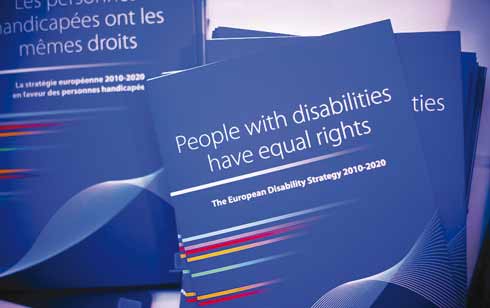In its most difficult time for the European Union since
its creation, when the economic crisis and political setback are curbing
and risking the reversal of development and the consolidation of the
community of states that have with more or less conviction participated in
the development of the first transnational entity of the history, the
European Commission passed on November 15th of last year its new
disability strategy for the period 2010-2020.
The strategy, introduced
in Parliament, before the Council and the other institutions of the EU
under Communication COM (2010) 636, "European Disability
Strategy 2010-2020: A Renewed Commitment to a Barrier-Free Europe"
outlines an action framework at the European level which, associated with
national measures, intends to respond to the various needs of persons with
disabilities.
Remembering that disability strikes about 80 million
people in the EU, limiting or preventing their participation to social and
economic life because of all sorts of barriers; that the rate of poverty
among persons with disabilities is 70% higher than the average; that the
ageing of the population entails an increase of the already high
disability rate among people over 70, the Commission underlines that there
exist tools to defend the rights of persons with disabilities.
The
Charter of Fundamental Rights of the European Union sets out under art. 26
that the Union recognises and respects the right of persons with
disabilities to benefit from measures designed to ensure their
independence, social and occupational integration and participation in the
life of the community, and in art. 21 it sanctions that any discrimination
based on disability shall be prohibited.
The Treaty on the Functioning
of the European Union sanctions in art. 10 that the Union shall combat
discrimination based on disability in defining and implementing its
policies and activities, and art. 19 states that the Union may take
appropriate action to do so.
The United Nations Convention on the
Rights of Persons with Disabilities is the first legally binding
instrument relating to human rights that has already been ratified by the
European Union and the majority of the Member States. The Convention
imposes to the States Parties to defend and safeguard human rights and
fundamental freedoms of persons with disabilities.
The strategy, which
is a fundamental political instrument for persons with disabilities and
their representing organizations, identifies eight main areas of action:
accessibility, participation, equality, employment, education and
training, social protection, health and external actions. For each area
are indicated, in an accompanying document, key actions to be implemented
by 2015. The areas of action were defined according to their potential
contribution in reaching the strategy's general objectives and those of
the UN Convention on the basis of the analysis of results and the impact
of the preceding Disability Action Plan 2003-2010, passed on the occasion
of the European Year of Persons With Disabilities.
The strategy
indicates actions at the community level that have to integrate those at
the national level. The Commission intends also to intervene on the
situation of persons with disabilities within the framework of the
European Disability Strategy 2010-2020, its flagship initiatives and the
reintroduction of the unique market.
Actions in the above mentioned
contexts require a new commitment of community institutions and all Member
States, and they have to be based on effective tools, those being
awareness, financial support and statistics and data collection and
monitoring. There are also the required mechanisms of the UN Convention to
guarantee their punctual implementation.
I) Awareness - The Commission will work to ensure that people with disabilities are aware of their rights, paying special attention to accessibility of materials and information channels. It will promote awareness of ‘design for all’ approaches to products, services and environments. EU action will support and supplement national public awareness campaigns on the capabilities and contributions of people with disabilities; and promote exchange of good practices among Member States, raise society’s awareness of disability issues and foster greater knowledge among people with disabilities of their rights and how to exercise them.
II) The Commission will work to ensure that EU programmes
in policy areas relevant to people with disabilities offer funding
possibilities, for example in research programmes. The cost of measures to
enable people with disabilities to take part in EU programmes should be
eligible for reimbursement. EU funding instruments, particularly the
Structural Funds, need to be implemented in an accessible and
non-discriminatory way. Optimise use of EU funding instruments for
accessibility and non-discrimination and increase visibility of
disability-relevant funding possibilities in post-2013 programmes.
III) Statistics and data collection and monitoring - The
Commission will work to streamline information on disability collected
through EU social surveys (EU Statistics on Income and Living Conditions,
Labour Force Survey ad hoc module, European Health Interview Survey),
develop a specific survey on barriers for social integration of disabled
people and present a set of indicators to monitor their situation with
reference to key Europe 2020 targets (education, employment and poverty
reduction).
Let us now introduce the eight areas of action that
sustain the strategy.
1. Accessibility
'Accessibility' is
defined as meaning that people with disabilities have access, on an equal
basis with others, to the physical environment, transportation,
information and communications technologies and systems (ICT), and other
facilities and services. There are still major barriers in all of these
areas. Accessibility is a precondition for participation in society and in
the economy.
The EU still has a long way to go in achieving this. For
example, on average in the EU-27, only 5% of public websites comply fully
with web accessibility standards, though more are partially accessible.
Many television broadcasters still provide few subtitled and
audio-described programmes. The Commission proposes to use legislative and
other instruments, such as standardisation, to optimise the accessibility
of the built environment, transport and ICT in line with the Digital
Agenda and Innovation Union flagships.

Based on smarter regulation principles, it will explore
the merits of adopting regulatory measures to ensure accessibility of
products and services, including measures to step up the use of public
procurement (proven to be very effective in the US). It will encourage the
incorporation of accessibility and ‘design for all’ in educational
curricula and training for relevant professions. It will also foster an
EU-wide market for assistive technology.
The Commission will consider
whether to propose a ‘European Accessibility Act’ by 2012. This could
include developing specific standards for particular sectors to
substantially improve the proper functioning of the internal market for
accessible products and services.
2. Participation
There are still many
obstacles preventing people with disabilities from fully exercising their
fundamental rights - including their Union citizenship rights - and
limiting their participation in society on an equal basis with others. The
Commission will work to: – overcome the obstacles to exercising their
rights as individuals, consumers, students, economic and political actors;
tackle the problems related to intra-EU mobility and facilitate and
promote the use of the European model of disability parking card; –
promote the transition from institutional to community-based care by:
using Structural Funds and the Rural Development Fund to support the
development of community-based services and raising awareness of the
situation of people with disabilities living in residential institutions,
in particular children and elderly people; – improve the accessibility of
sports, leisure, cultural and recreational organisations, activities,
events, venues, goods and services including audiovisual ones; promote
participation in sports events and the organisation of disability-specific
ones; explore ways of facilitating the use of sign language and Braille in
dealing with the EU institutions; address accessibility to voting in order
to facilitate the exercise of EU citizens' electoral rights; foster the
cross-border transfer of copyright works in accessible format; promote use
of the scope for exceptions provided by the 2001 Directive 29 on
copyright; EU action will support national activities to combat
discrimination on the basis of disability.

3. Equality
In order to eliminate
discrimination in the European Union based on disability, which over half
of all Europeans consider to be widespread, the Commission will promote
the equal treatment of people with disabilities through a two-pronged
approach. This will involve using existing EU legislation to provide
protection from discrimination, and implementing an active policy to
combat discrimination and promote equal opportunities in EU policies. The
Commission will also ensure that Directive 2000/78/EC banning
discrimination in employment is fully implemented; but there is no hint of
a proposal of cross-cutting directive on non-discrimination in discussion
at the present time. The Commission will promote diversity and combat
discrimination through awareness-raising campaigns at EU and national
level, and support the work of EU-level NGOs active in the area. EU action
will support and supplement national policies and programmes to promote
equality, for instance by promoting the conformity of Member State
legislation on legal capacity with the UN Convention.

4. Employment
Quality jobs ensure
economic independence, foster personal achievement, and offer the best
protection against poverty. However, the rate of employment for people
with disabilities is only around 50%. To achieve the EU’s growth targets,
more people with disabilities need to be in paid employment on the open
labour market. The Commission will exploit the full potential of the
Europe 2020 Strategy and its Agenda for new skills and jobs by providing
Member States with analysis, political guidance, information exchange and
other support.
It will improve knowledge of the employment situation of
persons with disabilities, identify challenges and propose remedies. It
will address intra-job mobility on the open labour market and in sheltered
workshops, through information exchange and mutual learning. It will also
address the issue of self employment and quality jobs.
EU action will
support and supplement national efforts to: analyse the labour market
situation of people with disabilities; fight those disability benefit
cultures and traps that discourage them from entering the labour market;
make workplaces more accessible, etc.
5. Education and
training
In the 16-19 age group the rate of non-participation
in education is 37 % for considerably restricted people, and 25% for those
restricted to some extent, against 17% for those not restricted. Access to
mainstream education for children with severe disabilities is difficult
and sometimes segregated. People with disabilities, in particular
children, need to be integrated appropriately into the general education
system and provided with individual support in the best interest of the
child.
With full respect for the responsibility of the Member States for the content of teaching and the organisation of education systems, the Commission will support the goal of inclusive, quality education and training under the Youth on the Move Initiative of the EU Strategy 2020. It will increase knowledge on levels of education and opportunities for people with disabilities, and increase their mobility by facilitating participation in the Lifelong Learning Programme. EU action will support national efforts through ET 2020, the strategic framework for European cooperation in education and training, to remove legal and organisational barriers for people with disabilities to general education and lifelong learning systems.
6. Social protection
Since little participation in
general education and the employment market leads to inequality in income,
poverty, social exclusion and seclusion, people with disabilities are
entitled to social protection systems, poverty reduction programs,
disability support, social housing programs and other basic services and
programs relating to pensions and social benefits.
The Commission will
evaluate the adequacy and sustainability of social protection programs and
will allocate funding through the European Social Funds. It will promote
national measures in order to guarantee decent living conditions for
persons with disabilities.
7. Health
Persons with disabilities are entitled to
equal access to healthcare, including preventive healthcare, and specific
affordable quality health and rehabilitation services. This is mainly the
task of the Member States, which are responsible for organising and
delivering health services and medical care. The Commission will support
policy developments for equal access to healthcare, including quality
health and rehabilitation services designed for people with disabilities.
It will pay specific attention to people with disabilities when
implementing policies to tackle health inequalities; promote action in the
field of health and safety at work to reduce risks of disabilities
developing during working life and to improve the reintegration of workers
with disabilities; and work to prevent those risks. EU action will promote
awareness of disabilities in medical schools and in curricula for
healthcare professionals; promote mental health services and the
development of early intervention and needs assessment services.

8. External action
The EU
and the Member States should promote the rights of people with
disabilities in their external action, including EU enlargement,
neighbourhood and development programmes. They will work until the
question of disability becomes an essential matter of human rights and
will promote the UN Convention in relation to the needs of persons with
disabilities. They will ensure that candidate and potential candidate
countries make progress in promoting the rights of people with
disabilities and ensure that the financial instruments for pre-accession
assistance are used to improve their situation.
The Commission is
committed to support national initiatives to further the rights of persons
with disabilities in relations with non member countries, including the UN
Convention. The Commission will foster agreement and commitment on
disability issues in international fora (UN, Council of Europe, OECD).
Accomplishments required by the United Nations Convention on the Rights of Persons with Disabilities.

The governance framework set out in art. 33 of the United
Nations Convention on the Rights of Persons with Disabilities (focal
points, coordination mechanism, independent mechanisms and participation
of persons with disabilities and their representative organizations) must
be addressed on two levels: vis-à-vis the Member States in a wide range of
EU policies, and within EU institutions. At EU level, mechanisms for
coordination based on existing facilities will be established both between
the Commission services and the EU institutions, and between the EU and
the Member States.
The implementation of the strategy and of the UN
Convention will be monitored by the Disability High Level Group in which
are represented organizations of persons with disabilities. Also, a
monitoring framework including one or more independent mechanisms will be
established to promote, protect and monitor implementation of the UN
Convention. By the end of 2013, the Commission will report on progress
achieved through this Strategy, covering implementation of actions,
national progress and the EU report to the UN Committee on the Rights of
Persons with Disabilities.
1) COM(2010) 2020, COMMUNICATION BY THE COMMISSION, EUROPE 2020, The EU strategy for smart, sustainable and inclusive growth.
2) Council conclusions of 12 May 2009 on a strategic
framework for European cooperation in education and training ET 2020 (OJ C
119, 28.5.2009) («ET 2020»).